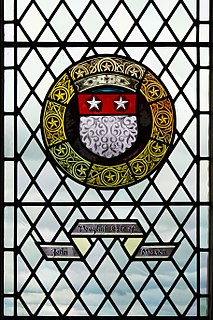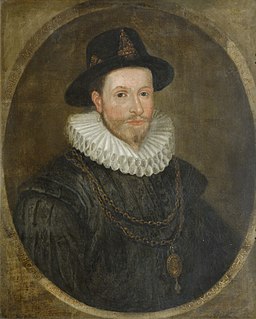
Duke of Hamilton is a title in the Peerage of Scotland, created in April 1643. It is the senior dukedom in that Peerage, and as such its holder is the Premier Peer of Scotland, as well as being head of both the House of Hamilton and the House of Douglas. The title, the town of Hamilton in Lanarkshire, and many places around the world are named after members of the Hamilton family. The ducal family's surname, originally "Hamilton", is now "Douglas-Hamilton". Since 1711, the Dukedom has been held together with the Dukedom of Brandon in the Peerage of Great Britain, and the Dukes since that time have been styled Duke of Hamilton and Brandon, along with several other subsidiary titles.

Clan Keith is a Highland and Lowland Scottish clan, whose Chief historically held the hereditary title of Marischal, then Great Marischal, then Earl Marischal of Scotland.
The title of Earl Marischal was created in the Peerage of Scotland for William Keith, the Great Marischal of Scotland.

John Douglas, 2nd Earl of Morton died 9 September 1513 at the Battle of Flodden.

The Lord High Constable is a hereditary, now ceremonial, office of Scotland. In the order of precedence of Scotland, the office traditionally ranks above all titles except those of the Royal Family. The Lord High Constable was, after the King of Scots, the supreme officer of the Scottish army. He also performed judicial functions as the chief judge of the High Court of Constabulary. From the late 13th Century the Court – presided over by the Lord High Constable or his deputies – was empowered to judge all cases of rioting, disorder, bloodshed and murder if such crimes occurred within four miles of the King, the King's Council, or the Parliament of Scotland. Following James VI's move to England, the jurisdiction of the Lord High Constable was defined in terms of the "resident place" appointed for the Council.

Mary Hay, 14th Countess of Erroll was a Scottish noblewoman and suo jure Countess of Erroll. As 18th Hereditary Lord High Constable and Knight Marischal of Scotland, she was the Senior Great Officer among the Royal Officers of Scotland and Chief of the King's Household in Scotland. She inherited these titles in 1717 on the death of her unmarried brother, Charles Hay, 13th Earl of Erroll.
Sir David Carnegie of Pitarrow, 4th Baronet FRS FRSE was a Scottish politician and 7th Earl of Southesk, 7th Baron Carnegie of Kinnaird and 7th Baron Carnegie, of Kinnaird and Leuchars.
George Gordon, 2nd Earl of Huntly was a Scottish nobleman and Chancellor of Scotland from 1498 to 1501.

Sir Robert Keith was a Scottish knight, diplomat, and hereditary Marischal of Scotland who commanded forces loyal to Robert Bruce at the Battle of Bannockburn.
Alexander of Menteith, a Scottish nobleman and member of the Stewart family, he was the Earl of Menteith.

George Keith, 5th Earl Marischal was a Scottish nobleman and Earl Marischal. He succeeded as earl on 7 October 1581, upon the death of his grandfather, William Keith, 4th Earl Marischal.

Clan Forbes is a Highland Scottish clan from Aberdeenshire, Scotland.
Robert Douglas, Earl of Morton was a Scottish nobleman and Earl of Morton. He was the son of William Douglas, 7th Earl of Morton and Lady Anne Keith, daughter of George Keith, 5th Earl Marischal. In 1627, he married Anne Villiers, a daughter of Sir Edward Villiers.

William Keith, 9th Earl Marischal was a Jacobite politician and Earl Marischal of Scotland.
Alexander Gordon, 3rd Earl of Huntly was a Scottish nobleman. He was a member of Parliament, a member of the Privy Council, a regent and Lieutenant of the kingdom.

William Keith, 4th Earl Marischal was a Scottish nobleman and politician.
Sir Adam de Gordon, Lord of Gordon was a 14th-century Scottish baron.

Sir Edward Keith was a Scottish nobleman and hereditary 11th Marischal of Scotland.
Elizabeth Gordon, Heiress of Gordon, Scottish baroness and progenitress of the Gordon Earls and Marquesses of Huntly.
Alexander Seton, Lord Gordon was a Scottish baron, Lord of Parliament and progenitor of the Gordon Earls and Marquesses of Huntly.










